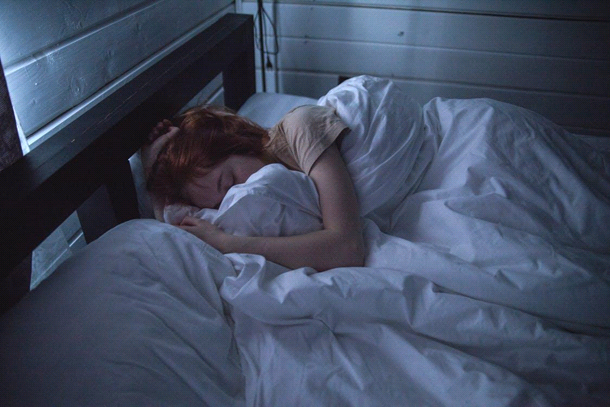Want Great Sleep? Avoid These Bad Habits…
We all know that getting good sleep at night has a direct impact on how we feel during the day. If you sleep poorly even one night, you will probably feel sluggish and tired the next day. If you continually get poor sleep it can lead to some serious health problems down the road.
However, while most of us know how important sleep is to our health, many people may not realize that they’re practicing poor sleep habits. Below is a list of seven bad sleeping habits to avoid as soon as possible:
 AVOID eating too close to bedtime.
AVOID eating too close to bedtime.
Eating too close to bedtime can disrupt your sleep, mostly because it gets your stomach acids going, and lying down can cause those acids to creep up into your throat. If you’re really craving a late night snack, try a bowl of cereal with milk or cheese and crackers. These types of foods are rich in minerals, such as tryptophan and calcium, which help promote sleep.- AVOID caffeine and nicotine close to bedtime.
Caffeine and nicotine are stimulants that, when taken within 3 hours of bedtime, can make it difficult to go to sleep or stay asleep until the chemicals wear off. Many people may recognize that drinks such as soda, tea, and coffee contain caffeine, but may not realize that foods such as chocolate also contain caffeine. - AVOID alcohol before bedtime.

Many people falsely believe that alcohol help promotes sleep as it makes them drowsy and more likely to fall asleep quicker. However, once your body begins to metabolize the alcohol there is a period of arousal, which disturbs one’s sleep.
- AVOID technology in the bed.
For the same reasons you shouldn’t have a TV or computer in your bedroom, you also shouldn’t have a cell phone, tablet, laptop, portable game console, or e-reader in the room either. Most of these devices also emit the sleep stealing light and are used for consuming content that may rob you of sleep because it’s so engaging.  AVOID hitting the Snooze Button.
AVOID hitting the Snooze Button.
Set your alarm and keep it away from your bed. Too often people get used to using their phone as their wake-up device. Having your phone close to your bed makes it too easy to continuously check it for new texts, emails, or just looking at the time. Constantly reminding yourself of the time can create anxiety, making sleep more difficult. Also, keeping your alarm away from your bed reduces the chances of hitting the snooze button over and over, and it makes you get up out of bed to shut it off.- AVOID a warmer bedroom temperature.
Your bedroom should be slightly cooler than the rest of your home. If you have the ability to control the temperature of individual rooms you should keep yours between 60-67 degrees Fahrenheit. When you sleep, your body temperature naturally begins to dip. Having a cool room helps facilitate this process, and having a room that is too hot can prevent it. - AVOID odd sleeping hours.

Getting into a regular routine of going to bed and rising at the same times every day is one of the most important practices you can perform for better sleep. Part of keeping a healthy bedtime routine is to keep it up even on the weekends by avoiding staying up late and sleeping in. Depriving yourself of sleep during the midweek and binge-sleeping on the weekends does more harm to your sleep cycles than good.
If you are practicing proper sleep hygiene and still have a difficult time sleeping through the night you may have a sleeping disorder. Do NOT avoid going to see your primary care physician or a certified sleep doctor to try to uncover any sleep disorders that need to be diagnosed and treated.
If you’re an Alaskan experiencing difficulty with maintaining quality sleep, contact the Alaska Sleep Clinic and receive a free 10-minute phone call with a sleep educator. In this phone call we can help determine if a sleep study at one of our 4 Alaskan locations may be appropriate in diagnosing and treating your condition. Don’t let poor sleep get in the way of you and success at work and your personal life, contact us today.




